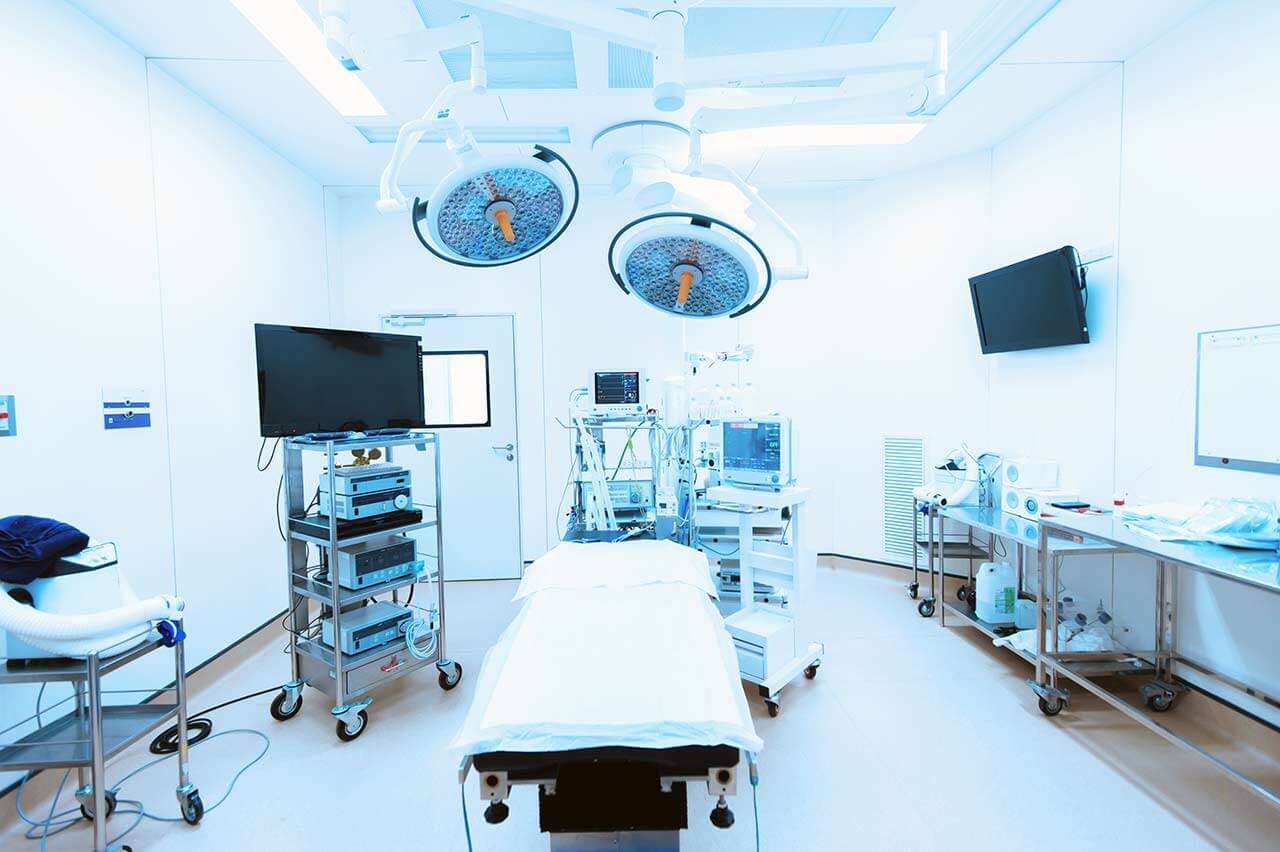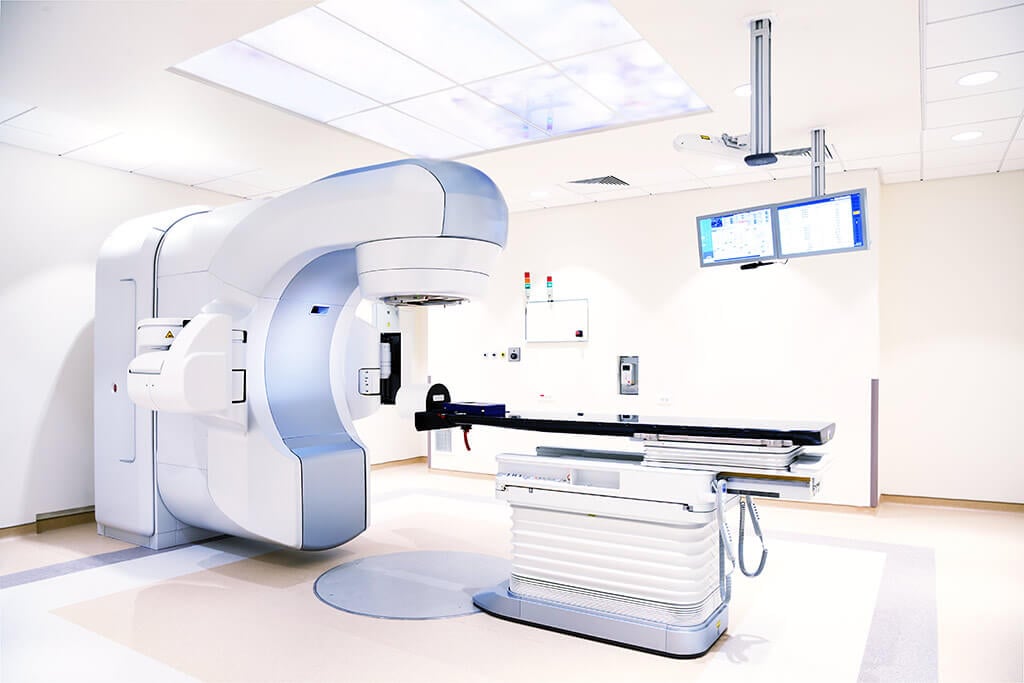
The program includes:
- Initial presentation in the clinic
- clinical history taking
- physical examination
- review of medical records
- laboratory tests:
- complete blood count
- general urine analysis
- biochemical analysis of blood
- TSH-basal, fT3, fT4
- indicators of inflammation (CRP, ESR)
- indicators blood coagulation
- abdominal ultrasound
- CT/MRI abdomen
- preoperative care
- rectocele resection
- symptomatic treatment
- control examinations
- the cost of essential medicines and materials
- nursing services
- nutrition recommendations
- full hospital accommodation
- explanation of future recommendations
Required documents
- Medical records
- Transvaginal ultrasound (if available)
- CT scan of the abdomen and pelvis (if available)
Service
You may also book:
 BookingHealth Price from:
BookingHealth Price from:
About the department
The Department of General and Abdominal Surgery, Hernia Surgery, Colorectal Surgery, Endocrine Surgery and Bariatric Surgery at the Catholic Clinic Koblenz-Montabaur provides all the options of modern surgical treatment for patients with benign and malignant abdominal diseases, hernias, and diseases of the rectum, thyroid gland, and parathyroid glands. The department includes the Obesity Center, which successfully performs operations on patients with a body mass index of more than 40 kg/m2. Hernia treatment is provided in a specialized Competence Center for Hernia Surgery, certified in accordance with the requirements of the German Hernia Society (DHG) and the German Society for General and Visceral Surgery (DGAV). It is important for the department's surgical team to provide each patient with the most sparing treatment. The use of minimally invasive and single incision laparoscopic surgery (SILS) is therefore a priority here. Even in complex cases where open surgery cannot be avoided, advanced technologies such as ultrasonic scissors, high-frequency coagulation devices, monitoring systems, and others ensure high treatment safety. The exceptional professionalism and rich experience of the department's surgeons also deserve special attention. The department is headed by Dr. med. Michael Düsseldorf.
The department's abdominal surgeons regularly treat patients with benign and malignant abdominal diseases. Of particular interest is the provision of medical care to patients with stomach, colon, rectal, pancreatic, and soft tissue cancers. When a cancer diagnosis is confirmed, a clinical case is considered at an interdisciplinary tumor board with the participation of surgeons, oncologists, gastroenterologists, and other specialists. A cancer treatment regimen is developed strictly on an individual basis. The department's abdominal surgeons are responsible for performing operations, which in most cases are supplemented with chemotherapy, radiation therapy, hormone therapy, immunotherapy, and other types of anticancer treatment. The extent of the operation depends on the stage of the oncological process: in the early stages, a malignant neoplasm is often removed, and in the case of advanced cancer, the affected organ is partially or totally removed. Whenever possible, the department's surgeons use low-traumatic laparoscopic techniques that contribute to the rapid recovery of the patient in the postoperative period.
An important focus in the department's clinical practice is hernia treatment. The department has been certified as a Hernia Competence Center by the German Hernia Society (DHG) and the German Society for General and Visceral Surgery (DGAV). The department's surgeons specialize in the treatment of inguinal, umbilical, incisional, diaphragmatic, and parastomal hernias. The department annually performs 200-300 such operations of varying complexity. The optimal type of surgical intervention is selected taking into account the patient's individual clinical indications and needs. In most cases, surgeons at the medical facility perform hernioplasty using artificial mesh implants. Minimally invasive techniques are used to provide a surgical approach.
Another focus of the department's work is colorectal surgery. The specialists in this field are engaged in the surgical treatment of rectal diseases. The department has successful experience performing operations for hemorrhoids, which are pathological varicose veins with the formation of hemorrhoidal nodes in the lower part of the rectum. The most effective and widely used operation for hemorrhoids in the department is stapled hemorrhoidopexy (the Longo procedure). When performing the intervention, surgeons remove a circular section of the mucous membrane and submucosal tissues with blood vessels, due to which it becomes possible to tighten the hemorrhoidal nodes and deprive them of their blood supply. The lack of blood flow to the hemorrhoidal nodes leads to their gradual disappearance. The Longo procedure is performed under local anesthesia using minimally invasive techniques. Its duration is only 15-20 minutes. After the operation, the patient remains in the hospital for some time under medical supervision, after which, before discharge, he receives the necessary recommendations on nutrition and care of the surgical wound.
In the field of endocrine surgery, special attention is paid to the surgical treatment of diseases of the thyroid gland and parathyroid glands. The department's specialists perform a hemithyroidectomy (removal of a lobe of the thyroid gland) and a thyroidectomy (total removal of the thyroid gland). Operations of this kind are performed using minimally invasive techniques, due to which the patient experiences practically no pain in the postoperative period and the risks of developing postoperative complications are negligible. In addition, minimally invasive techniques ensure good aesthetic results, as hardly noticeable scars remain. An important point is the use of a modern intraoperative neuromonitoring system during thyroid surgery. Such an approach guarantees preservation of the integrity of the recurrent laryngeal nerves, damage to which may lead to voice loss.
The department also has a specialized Obesity Center, certified in accordance with the requirements of DIN EN ISO 9001:2008 standards and the standards of the German Society of Surgery and the German Society for General and Visceral Surgery. Morbid obesity is becoming more common in the world every year, and in many cases, overweight patients cannot get rid of excess weight using conservative methods such as diet therapy, sports, or drugs. In such cases, bariatric surgery is the only option. The department successfully performs sleeve gastroplasty, gastric bypass surgery, and gastric banding. The goal of all these surgical procedures is to reduce the volume of the stomach so that satiety is achieved with less food consumed, resulting in weight loss. For patients undergoing bariatric surgery, it is important to understand that after the surgical intervention, it will be necessary to adhere to a diet and exercise regularly because only a comprehensive approach will save the result of surgical treatment.
The department's range of surgical services includes:
- General and abdominal surgery
- Surgery for benign abdominal diseases
- Laparoscopic appendectomy
- Laparoscopic cholecystectomy
- Laparoscopic colon resection for diverticulitis
- Laparoscopic removal of adhesions (adhesiolysis)
- Urgent surgical interventions for acute abdominal diseases
- Surgery for malignant abdominal diseases
- Laparoscopic and open surgery for stomach cancer
- Laparoscopic and open surgery for colon cancer
- Laparoscopic and open surgery for rectal cancer
- Laparoscopic and open surgery for pancreatic cancer
- Laparoscopic and open surgery for soft tissue sarcomas
- Surgery for benign abdominal diseases
- Hernia surgery
- Laparoscopic hernioplasty with mesh implantation for inguinal, umbilical, incisional, diaphragmatic, and parastomal hernias
- Colorectal surgery
- Minimally invasive operations for hemorrhoids, including the Longo procedure
- Minimally invasive surgery for rectal prolapse
- Minimally invasive surgery for anal and rectal fistulas
- Endocrine surgery
- Minimally invasive hemithyroidectomy (removal of a lobe of the thyroid gland)
- Minimally invasive thyroidectomy (total removal of the thyroid gland)
- Minimally invasive parathyroidectomy (removal of the parathyroid glands)
- Bariatric surgery
- Sleeve gastroplasty
- Gastric bypass surgery
- Gastric banding
- Other medical services
Photo of the doctor: (c) Katholisches Klinikum Koblenz - Montabaur
About hospital
The Catholic Clinic Koblenz-Montabaur is a modern medical facility with an excellent reputation in Germany and abroad. The medical center is an academic clinic of the University Hospital Mainz, which gives patients the opportunity to take advantage of scientific advances and innovative treatments. The clinic has the widest possibilities for providing effective medical care to patients with both common and especially complex and rare pathologies. In December 2017, the clinic was certified in accordance with DIN EN ISO 9001:2015 standards, and in 2020, it was successfully recertified, which is a confirmation of the high quality of medical service. The clinic has 20 departments with 17 highly specialized centers integrated into them. The bed fund of the medical facility includes 657 beds. More than 32,000 inpatients and about 133,000 outpatients receive medical care here annually.
Many medical specialties are available at the clinic, including general and abdominal surgery, bariatric surgery, vascular surgery, thoracic surgery, cardiology, pulmonology, gynecology, urology, neurology, orthopedics, traumatology, radiology, nuclear medicine, and others. Each of the medical specialties is represented by an experienced team of doctors and nursing staff who do their best to restore the patient's health. Doctors of various medical fields work in close cooperation, which allows for an interdisciplinary approach to solving health problems.
The pride of the clinic is the advanced technical base, which plays an important role in accurate examinations and effective treatment. For example, the operating rooms at the clinic are equipped in accordance with the current requirements of European medicine, due to which most surgical interventions are performed using sparing techniques, including laser surgery, video-assisted thoracoscopic surgery, arthroscopy, endovascular and hybrid surgical techniques, etc.
Despite the clinic's high-tech infrastructure, there is an atmosphere of understanding, sympathy, and respect for the patient. The medical team shows a humane attitude towards patients and takes care of their comfort throughout the entire period of treatment. Doctors devote enough time to personal communication with patients, which makes it possible to take into account their individual needs and wishes during the therapeutic process.
Photo: (с) depositphotos
Accommodation in hospital
Patients rooms
The patients of the Catholic Clinic Koblenz-Montabaur live in comfortable single and double rooms with light colors and modern design. Each patient room has an ensuite bathroom with a shower and a toilet. The furnishings of a standard patient room include an automatically adjustable bed, a bedside table, a wardrobe, a table and chairs for receiving visitors, and a TV. The telephone is provided for a fee. Wi-Fi is available upon request.
The clinic also offers enhanced comfort rooms corresponding to the level of a five-star hotel. These patient rooms are more spacious and have a sophisticated design. The bathroom of the enhanced comfort rooms has a set of toiletries, changeable towels, and a bathrobe.
Meals and Menus
The patient and the accompanying person can choose meals from three menus daily. If, for some reason, you do not eat all the foods, you will be offered an individual menu. Please inform the nursing staff of your dietary preferences prior to treatment.
Patients living in enhanced comfort rooms are additionally offered free soft drinks, coffee, tea, desserts, and fresh fruits.
Further details
Standard rooms include:
Religion
A Catholic liturgy is held every Sunday morning in the church at the clinic. The divine liturgy is also broadcast on the clinic's internal TV channel.
Accompanying person
Your accompanying person may stay with you in your patient room or at the hotel of your choice during the inpatient program.
Hotel
You may stay at the hotel of your choice during the outpatient program. Our managers will support you for selecting the best option.





